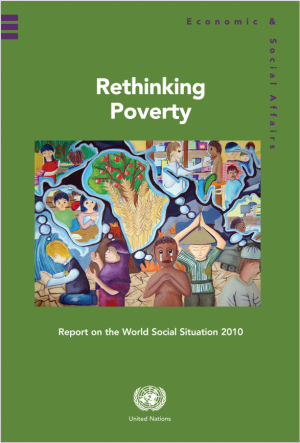Fifteen years ago, in Copenhagen, global leaders at the World Summit for Social Development described poverty eradication as an ethical, political and economic imperative, and identified it as one of the three pillars of social development. Poverty eradication has since become the overarching objective of development, as reflected in the internationally agreed development goals, including the Millennium Development Goals, which set the target of halving global extreme poverty by 2015.
Rethinking Poverty, the 2010 issue of the Report on the World Social Situation seeks to contribute to rethinking poverty and its eradication. It affirms the urgent need for a strategic shift away from the market fundamentalist thinking, policies and practices of recent decades towards more sustainable development- and equity-oriented policies appropriate to national conditions and circumstances. Such national development strategies, as called for by the 2005 World Summit, should seek to achieve the development goals. Responsible development and counter-cyclical macroeconomic policies to foster productive investments and generate decent employment must be at the core of this effort.
The Report makes a compelling case for rethinking poverty and poverty-reduction efforts, saying that over-reliance on market forces and economic liberalization have led to neglect of nationally designed and developmentally-oriented strategies, to the detriment of the world’s poor. The most important lesson, according is that governments need to play a developmental role, integrating economic and social policies that support inclusive output and employment growth, while attacking inequality and promoting justice.
Click here to view the full report
Chapters of the Report
- Executive Summary
- Preface and Table of Contents
- Chapter I: Rethinking poverty: which way now?
- Chapter II: Poverty: the official numbers
- Chapter III: The poverty of poverty measurement
- Chapter IV: Deprivation, vulnerability and exclusion
- Chapter V: Macroeconomic policies and
poverty reduction - Chapter VI: Economic liberalization and
poverty reduction - Chapter VII: Labour-market and social policies and poverty reduction
- Chapter VIII: Poverty reduction programmes
- Chapter IX: Rethinking poverty reduction interventions
- Bibliography
16 February 2010
The United Nations University of New York (UNU-ONY) held a book launch to discuss issues raised in Rethinking Poverty: Challenges of achieving poverty reduction, which remains an ethical, political and economic imperative.The event featured Dr. Jomo Kwame Sundaram, United Nations Assistant Secretary-General for Economic Development in the UN Department of Economic and Social Affairs (DESA), and (Honorary) Research Coordinator for the G-24 Intergovernmental Group on International Monetary Affairs and Development. The Q&A session following the presentation was moderated by UNU's Director Dr. Jean-Marc Coicaud.
- Dr. Jomo Kwame Sundaram's presentation - Rethinking Poverty (Presentation)
 Welcome to the United Nations
Welcome to the United Nations
